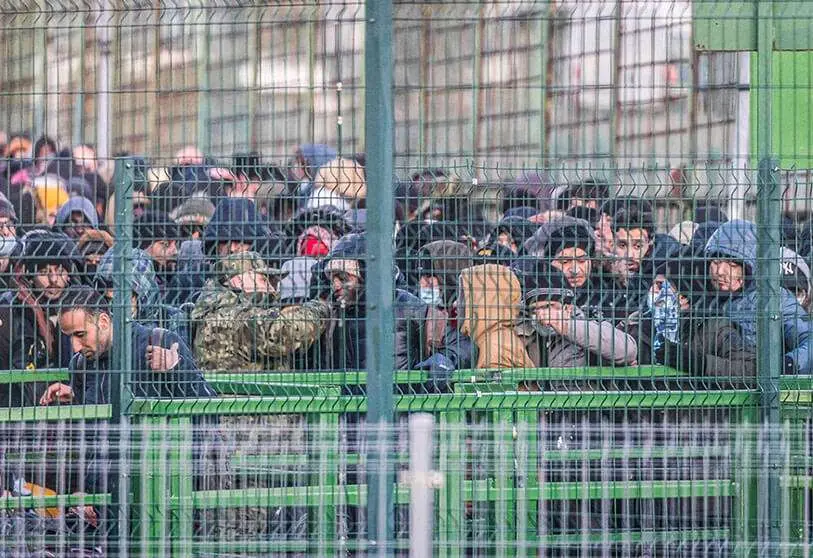Philosophy and migration

In recent times, different analysts have coincided in highlighting the favourable reception that European states and citizens are giving to Ukrainian refugees fleeing the war, in contrast to that given to citizens from other conflicts who, in similar circumstances, sought refuge in the past -and are currently seeking refuge in EU states, finding a much more lukewarm response, if not full of obstacles and practical inconveniences, to their requests for reception -such as the enormous difference between the current situation and what happened with the Syrian displaced persons in 2015-.
In the crisis resulting from Russia's invasion of Ukraine, the EU has been quick to take up an old regulation - specifically Directive 2001/55/EC, drafted in 2001 to facilitate the reception of refugees from the Kosovo war - in order to apply it to Ukrainian citizens - and only to them - fleeing the invasion of their country. Although the measure has been very positively received, both by public opinion and by entities and organisations dedicated to helping refugees - since the directive in question guarantees immediate asylum, as well as a transit visa for the entire territory of the EU - the discrimination it entails with respect to displaced persons from other countries who, in similar situations, also wish to have access to the security and protection offered by European soil has also been highlighted and expressed in the media.
Without going into the reasons that may lie behind this different consideration, which is clearly discriminatory - in the sense that it selects by excluding - it seems desirable and reasonable to establish principles that would allow people in the same circumstances to receive the same treatment, regardless of their geographical origin, religion or skin colour. Perhaps a reading of Jürgen Habermas' reflections on the subject might help in establishing these criteria.
Indeed, the recent publication of a short work compiling the German philosopher's otherwise scarce writings on migration - I am referring to 'Refugiados, migrantes e integración. Una breve antología', Madrid, Tecnos, 2022-, excellently contextualised and commented by Professor Juan Carlos Velasco, author of the edition, allows us to think about questions of reception -and integration- in a profound and coherent way, so that principles can be established that serve to inspire legal texts applicable to all cases, regardless of the specific circumstances of one or other crisis.
In his preliminary study, Juan Carlos Velasco groups Habermas's considerations on the subject into two sections: (a) the duty to admit refugees and migrants; and (b) the conditions of integration of these two figures in a democratic state.
With regard to the first question, Habermas points out - in a text dated 1993 - the need to consider refugee and economic migrant issues in the same way, given the degree of overlap between the two situations. As Professor Velasco points out, in today's world it is sometimes difficult to pinpoint a single reason for migration, and we find that people move for different reasons at the same time, forming mixed flows.
However, Juan Carlos Velasco reminds us that Habermas is aware of the practical difficulty of extending refugee protection to economic migrants, and considers that the debate on the scope of the right to asylum obscures the underlying problem: the need for the EU to equip itself with a migration policy capable of providing "those who migrate for different reasons with legal and safe options other than those provided by political asylum" (p. 21).
Over time, as Professor Velasco points out, Habermas gradually qualified this position, which was so favourable to the extension of the right to asylum, to the point that, in the context of the migration crisis of 2015, he proposed limiting this right because he considered it to be economically unviable.
With regard to the second section, Habermas conceives the integration process as a bilateral process of mutual accommodation: the newcomer has the right to preserve the cultural patterns that characterise his or her way of life, while at the same time having the duty to accept the political framework of coexistence - defined by constitutional principles and human rights - of the country that receives him or her. For their part, the citizens of the host country must broaden their horizons, be open to new ideas, even if they find them unacceptable and provoke "cognitive dissonance" in them.
For Habermas, this bilateral process presupposes a clear-cut distinction between two levels of integration: that of the elements that make up the political culture of a society; and that of the various ways of life that individuals can freely choose. We should expect immigrants to commit themselves to the first level, their "political acculturation", but not demand that they identify with the second, an "ethno-cultural integration" that implies the abandonment of their own ways of life.
I have summarised here only a part of Professor Habermas's ideas on migration issues which, as has been said, are now within our reach thanks to the excellent annotated anthology that Juan Carlos Velasco has made available to readers. In our opinion, it is reflections of this type, calmly matured outside of political urgencies -although not alien to them-, which should lay the foundations for migratory debates, and inspire the legal texts and decisions to be adopted in each situation.
Luis Guerra, PhD in Philology, is an associate researcher on the INMIGRA3-CM project, financed by the Community of Madrid and the European Social Fund

